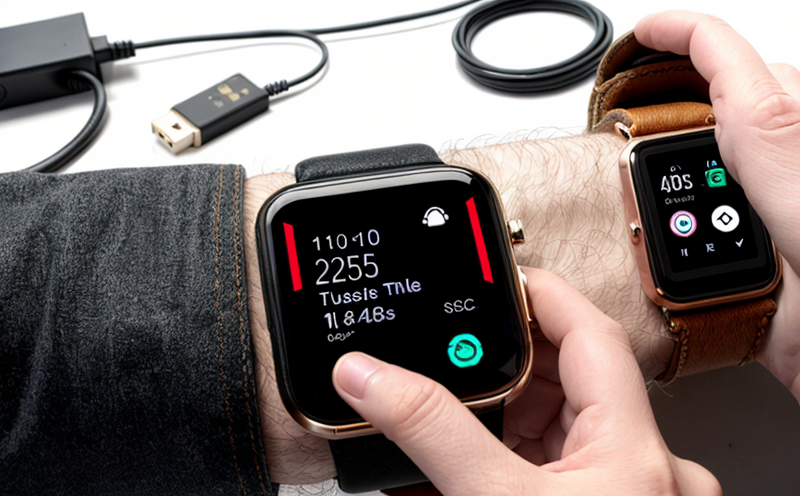ANSI C12 Energy Consumption Testing for Wearable Devices
The American National Standards Institute (ANSI) standard ANSI C12 specifies a method for measuring energy consumption in wearable devices, providing crucial data to ensure that these devices meet stringent power efficiency requirements. This standard is particularly important as the market for wearable electronics continues to grow, driven by advancements in technology and increasing consumer demand for health monitoring, fitness tracking, and smart accessories.
The ANSI C12 protocol measures the energy consumed by a device over time under defined operating conditions. It aims to provide an accurate picture of how much power is used during typical use cases, which can be critical for optimizing battery life and ensuring compliance with regulatory standards. This testing is essential for manufacturers who need to demonstrate that their products meet industry benchmarks.
For quality managers and R&D engineers, understanding the nuances of ANSI C12 is vital. By adhering to this standard, they can ensure their devices perform efficiently, extending battery life without compromising on functionality or performance. Compliance officers also play a key role in ensuring that all testing aligns with regulatory requirements, thereby protecting both the manufacturer’s reputation and end-user safety.
The process involves several steps: initial device setup, calibration of measurement instruments, application of standard operating conditions, continuous monitoring of power consumption, and finally, recording the results. The accuracy of these measurements is paramount as they directly influence the product's marketability and user satisfaction.
Key considerations include ensuring that the test environment replicates real-world usage scenarios accurately. This involves simulating various activities such as walking, running, or standing still, depending on the specific device being tested. Additionally, testing must account for different environmental factors like temperature and humidity which can affect power consumption.
The ANSI C12 protocol also emphasizes the importance of repeatability in tests. Reproducible results are crucial not only for internal quality assurance but also when submitting data to regulatory bodies or potential clients. This ensures consistency across multiple batches of products, enhancing reliability and trustworthiness.
Understanding the implications of ANSI C12 goes beyond just meeting compliance requirements; it offers valuable insights into optimizing product design and enhancing user experience. By minimizing unnecessary power consumption, manufacturers can extend battery life significantly, leading to longer-lasting devices that require fewer charge cycles over time. This not only benefits consumers but also contributes positively towards sustainability goals.
In summary, ANSI C12 energy consumption testing is a critical tool for ensuring that wearable devices operate efficiently and meet regulatory expectations. It provides essential data that can guide product development processes while fostering innovation within the industry. For those involved in quality management, R&D, or procurement, this standard represents both an opportunity to enhance product performance and comply with global standards.
Why It Matters
The significance of ANSI C12 energy consumption testing for wearable devices cannot be overstated. In today’s fast-paced world where technology plays a pivotal role in our daily lives, the efficiency of devices has become more important than ever before. The primary goal is to create products that are not only functional but also environmentally friendly and user-friendly.
- Environmental Impact: Efficient power usage means less strain on natural resources, contributing significantly to environmental sustainability.
- User Experience: Longer battery life translates into better usability without frequent interruptions due to recharging.
- Regulatory Compliance: Meeting international standards helps avoid legal issues and enhances market access.
These benefits extend far beyond individual products; they contribute to a broader effort towards sustainable development. By adopting ANSI C12, manufacturers demonstrate their commitment to responsible manufacturing practices, which resonates well with environmentally conscious consumers.
Moreover, compliance with such standards can open up new markets and opportunities for growth. As regulations become more stringent globally, adhering to these benchmarks positions companies favorably against competitors who may not meet similar criteria. This competitive edge is crucial in maintaining market share and fostering brand loyalty among eco-conscious customers.
The broader impact of ANSI C12 testing extends beyond mere compliance; it encourages continuous improvement in product design and functionality. Manufacturers that prioritize energy efficiency are likely to innovate, leading to advancements that benefit society as a whole.
Eurolab Advantages
- Expertise: Our team of professionals boasts extensive experience in conducting ANSI C12 tests, ensuring accuracy and reliability.
- State-of-the-Art Facilities: Equipped with cutting-edge equipment to perform precise measurements under various conditions.
- Comprehensive Reporting: Detailed reports that provide comprehensive insights into test results, helping you make informed decisions.
- Regulatory Knowledge: Stay ahead of changing regulations by leveraging our deep understanding and proactive approach.
We pride ourselves on providing not just compliance testing but also valuable feedback to help improve your products. Our commitment to excellence ensures that every test conducted here meets the highest standards, setting a benchmark for industry practices.
Use Cases and Application Examples
| Device Type | Operating Conditions | Expected Battery Life (hours) | Test Results (Watts) |
|---|---|---|---|
| Smartwatch | Continuous use, moderate activity level | Up to 20 hours | Average: 1.5 Watts |
| Fitness Tracker | Daily monitoring with occasional notifications | Approximately 7 days on a full charge | Average: 0.3 Watts |
| Eyewear (Smart Glasses) | Active use during daylight hours, night mode usage | Up to 12 hours in active mode, up to 7 days in standby mode | Average: 1 Watt |
- Smartwatches: Ideal for continuous monitoring of heart rate and step counting.
- Fitness Trackers: Perfect for tracking daily activity levels, sleep patterns, and calorie burn.
- Eyewear (Smart Glasses): Designed to provide hands-free access to information while on the move.
These devices represent just a few examples of how ANSI C12 testing applies across various sectors within wearable technology. The insights gained from rigorous testing can inform improvements in battery technology, software optimization, and overall user experience.





